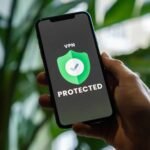
A Virtual Private Network (VPN) plays a crucial role in enhancing the security of your network connection, especially when you’re utilizing a public network. Consider a scenario where you’re at an airport and opt to use the complimentary public Wi-Fi provided there. While you intend to accomplish important tasks and access specific websites, you’re apprehensive due to the potential vulnerabilities associated with public Wi-Fi networks.
By employing a VPN, your internet traffic is encrypted, and your online identity is cloaked. Its primary function is to make it challenging for anyone to trace your online activities, safeguarding you against potential attackers who exploit vulnerabilities in public networks. This might sound reminiscent of the unsettling futuristic worlds portrayed in movies, but the reality of the threat landscape necessitates awareness of the risks you face and the essential protective measures, like utilizing a VPN, to ensure the security of your online activities.
A VPN serves to obscure your online identity, known as your IP address. When you deploy a VPN, your IP address is rerouted through a dedicated remote server operated by the VPN provider. To simplify this process: when you send a request to access online content (such as a website), this request travels through the VPN server, rendering your Internet Service Provider (ISP) and other potential third parties unaware of the websites you’re visiting. They lose the ability to monitor your browsing activities, thereby ensuring the confidentiality of your web interactions.
There are different VPN service providers out there that provide different types of VPN services, you may compare prominent services their offers, and extra security features before making the decision. You may read this guide expressvpn vs surfshark for a more detailed comparison.
The VPN establishes a secure data tunnel that connects your local network on one end and an exit node, often located miles away, on the other. This strategic setup deceives ISPs and other entities trying to track your location, making them believe you’re situated elsewhere.
Furthermore, a VPN employs encryption to safeguard your data as it traverses Wi-Fi networks. Consequently, even if cybercriminals gain access to your data, they are unable to decipher its contents. This heightened security enables you to confidently use any network, including public Wi-Fi, without compromising your safety.
A VPN becomes valuable when safeguarding your privacy during online browsing. This is its most significant advantage. So, what types of information can a VPN mask?
Using a VPN effectively conceals your browsing history, ensuring that neither your ISP nor your web browser has insight into the websites you frequent. Numerous reasons exist for desiring to keep your browsing history private. For instance, you might be searching for the best hotel rates. Without a VPN, hotel websites would detect your pursuit of the lowest prices and inundate you with targeted ads that might not necessarily offer the most cost-effective rates.
Additionally, there are instances when you seek sensitive information online, such as details about a medical condition. In the absence of a VPN, your searches are susceptible to tracking.
Perhaps you wish to access a website discreetly. Without a VPN, your IP address is exposed. While the websites you visit might not be illegal, there are legitimate reasons for wanting to shield this information. Your IP address, and consequently your location, can be tracked if you’re not using a VPN. Consider the potential consequences if malicious actors gained access to your search history – it could lead to potential blackmail.
The devices you utilize, such as laptops, tablets, and smartphones, are susceptible to cyberattacks. A VPN encrypts all data transmitted and received, making it challenging for cybercriminals to infiltrate your devices, even on public Wi-Fi networks. This security becomes particularly crucial as many individuals now work from home, relying on personal ISPs that may not prioritize users’ browsing privacy.
In remote work scenarios, you may need to access your company’s network resources. It’s important to recognize that cybercriminals are also targeting this requirement. Failing to securely access these resources can create a vulnerable entry point for malicious activity. Utilizing a VPN to access your corporate network provides the advantage of robust encryption, ensuring the secure retrieval of important corporate files.
Combining a VPN with an antivirus solution is imperative for comprehensive online safety. Solutions like Sophos Home adopt a multi-layered approach to security, protecting your home computer against advanced threats. This software conducts thorough malware scans, identifying and eliminating hidden threats such as viruses, trojans, rootkits, and spyware.
Furthermore, it employs AI-enabled threat detection to counter viruses, worms, and bots and includes ransomware security to safeguard personal files from encryption. By using Sophos Home, you benefit from comprehensive protection against cyber threats that could wreak havoc on your computer and personal life.
Research Snipers is currently covering all technology news including Google, Apple, Android, Xiaomi, Huawei, Samsung News, and More. Research Snipers has decade of experience in breaking technology news, covering latest trends in tech news, and recent developments.